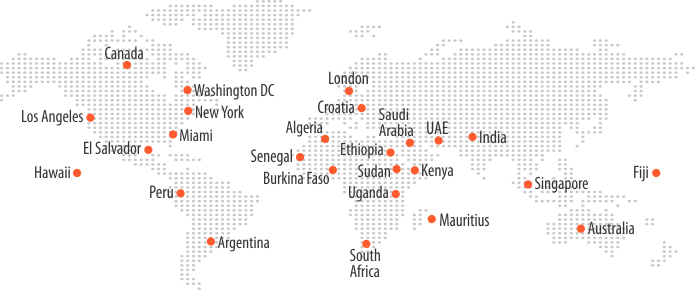The Role of SD-WAN in Optimizing Wholesale Voice Traffic

The need for versatile and exact voice traffic management systems is constant, and the telecommunications industry promptly responds to this need by delivering the latest communication devices. The telecommunications industry is an integral segment of global telecommunications that ensures seamless communications between people, institutions, and businesses worldwide. Looking at SD-WAN’s elasticity in improving wholesale voice services traffic entices the discussion of how the technology is designed to ease tensions and make voice services better and a totally different experience.
Given the rapid increase of digital communication technologies, it has been high time to focus on a solid, reliable infrastructure and innovative solutions.
SD-WAN, or Software-Defined Wide Area Network, is an utterly game-changing communication technology. In contrast with Wide Area Network (WAN) solutions, SD-WAN benefits from the underlying principle of intelligent networking, giving network managers complete control and versatility regarding network resources management.
Understanding Wholesale Voice Traffic
To a considerable extent, wholesale voice traffic is the fundamental pillar of the global telecommunications industry, service providers, and enterprises through the worldwide communications system. Wholesale voice traffic covers the transmission of voice call data via networks, and the termination of those calls is included.
An effective way of telecommunication networks is to organize and manage voice traffic at wholesale terms to achieve consistent quality, smooth communication, and rational acquisition costs. At the same time, the intricacies of wholesale voice have nettled the telecom operators during their most challenging times.
What is wholesale voice traffic?
Wholesale Voice Traffic exchanges voice traffic between wholesale carriers or service providers. Voice over Internet Protocol (VoIP) Wholesale providers facilitate this task. These providers are crucial in terminating voice calls globally, connecting diverse networks and geographies.
Importance of efficient voice traffic management for telecom providers
Telcos count on wholesale voice traffic to generate a financial base and ensure customer satisfaction. An efficient voice traffic management mechanism becomes critical as it helps meet Service Level Agreements (SLAs), provides Quality of Service (QoS), and optimizes the related yardstick of network performance.
Introduction to SD-WAN
SD-WAN is a networking technology that abstracts network hardware and control functions, allowing centralized management and dynamic traffic routing. SD-WAN enables agile network provisioning, optimization, and security enhancements by decoupling the control plane from the underlying hardware.
How SD-WAN differs from traditional WAN solutions
In sharp contrast to old WAN techniques, like MPLS (Multiprotocol Label Switching), SD-WAN represents the new management function implemented in the software domain.
Unlike MPLS, which utilizes static upstream circuits and manual configuration, SD-WAN uses software-defined networking principles to provide agility, scalability, and cost-effectiveness.
Key features of SD-WAN technology
SD-WAN orchestration brings many characteristics and benefits that revolutionize the management and optimization process. This, in turn, has made voice networking very convenient for telecom providers.
Here’s an in-depth look at some of the key features and benefits:
1. Centralized Orchestration and Management
SD-WAN is a platform that integrates all the network components at a centralized point and manages the network resources, configurations, and policies. It integrates widely on a staged network that can be monitored and easily deployed.
Centralization of management is a way to minimize organizational complexity, administrative costs, and management and support staff load. Administrators can rapidly roll out announced changes, enforce policies, and monitor network efficiency from a single panel.
Hence, the whole process of controlling the network is more accessible and less time-consuming.
2. Application-Aware Routing and Traffic Prioritization
SD-WAN, in turn, is application-aware; consequently, it can intelligently identify and prioritize traffic based on the application type and the required attributes. This will ensure that bandwidth and latency issues will not affect critical applications like voice and video.
SD-WAN ensures that voice traffic precedes other data traffic by defining priorities within the internal network. This guarantees high-quality voice sessions without jitter, latency, or packet loss.
This is crucial to maintaining the standard of surplus interconnections.
3. Cost Savings Through Efficient Utilization of Network Resources
SD-WAN can intelligently provision combined links such as broadband, LTE, and MPLS to improve network throughput while controlling costs. It does this traffic routing over the most cost-effective paths that do not also impair quality.
SD-WAN might be one factor that can control the budget and spending on the network by taking advantage of cheaper broadband links along with MPLS.
By increasing transmission efficiency and allowing better frequencies, telecom providers save costs while maintaining the quality of voice services, thus enhancing their business profit.
The Role of SD-WAN in Optimizing Wholesale Voice Traffic
SD-WAN Technology, a solution for overcoming voice traffic management problems, is becoming increasingly crucial. By utilizing its full suite, SD-WAN increases voice services’ quality, reliability, and productivity.
This section explores how SD-WAN achieves these improvements through several vital mechanisms:
Prioritization of Voice Packets
SD-WAN can differentiate between and classify voice traffic as a traffic flow that should be accorded priority over other traffic flows. This guarantees that voice communications serve bandwidth and latency at a low level, which is indispensable for maintaining high-quality conversations.
Traffic Shaping and Optimization Techniques
SD-WAN streams data flow by prioritizing certain packets over others and limiting the amount of data entering the network. Such an extension of voice carrying capacity is beneficial to prevent the network from connecting and ensure smooth and continuous voice traffic.
On the other hand, optimization methods based on data compression and deduplication performance allow voice data to travel through the communication channels even more effectively.
Ensuring High Availability and Reliability of Voice Services
SD-WAN ensures multiple traffic dedication and failover capabilities through network routing via different paths. (e.g., MPLS, broadband, LTE). If the voice service encounters downgrade or degradation, the SD-WAN can automatically reroute the traffic to the backup path, and the service is not disconnected. This guarantees the always-available operation and reliability of wholesale voice packets necessary for such traffic.
Routing Voice Traffic Through the Most Efficient Path
SD-WAN is a technology that constantly evaluates network conditions like latency, jitter, and packet loss throughout the entire network. This data-driven schema allows it to decide dynamically on the best voice path available at any given time. Dynamic routing selection provides a mechanism for voice calls to route through the best possible network route, thereby minimizing the disruptions that would otherwise occur and maintaining the quality of the call.
Proactive Identification and Resolution of Voice Traffic Issues
SD-WAN solutions will be capable of providing real-time monitoring and analytics. From this, telecommunication companies can draw hugely beneficial inferences about network performance and voice traffic patterns over time.
This approach to network proactiveness means that issues such as network congestion, equipment failure, or security threats are noticed before they become a problem for voice communication, allowing corrections to be made quickly before service interruptions occur.
By leveraging SD-WAN, providers can overcome the traditional challenges of voice traffic management and significantly improve service performance and customer satisfaction.
Unlock Superior Voice Service with SD-WAN Solutions from Bankai
Integrating SD-WAN technology is transforming how telecom providers manage wholesale voice traffic. By offering enhanced Quality of Service, dynamic path selection, and robust security, its addresses the critical challenges of cost-effectively maintaining high-quality, reliable voice services.
As the telecommunications landscape continues to evolve with advancements like 5G and edge computing, SD-WAN stands out as a critical enabler of future-proof voice traffic optimization.
Bankai Group is uniquely positioned to help telecom providers leverage the full potential of SD-WAN technology.
Providers can seamlessly transition to a more efficient and reliable network infrastructure by partnering with us, ensuring superior voice service delivery and operational excellence.
Embrace the future of voice traffic management with Bankai Group’s tailored SD-WAN solutions and stay ahead in the competitive telecommunications industry.






